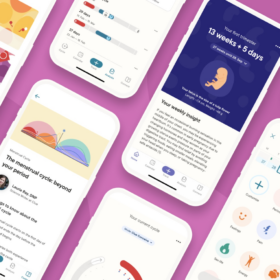
What is Naproxen and what is it used for?
In this article
What's the lowdown?
Naproxen is a strong anti-inflammatory medication that can be used to treat pain
It is usually a prescription only medication
As it is quite a strong drug, it is can’t be used by people with certain medical conditions
Long term naproxen use can irritate the stomach lining and cause stomach ulcers
Naproxen can help with period pain and heavy periods
What is naproxen? What is naproxen used for?
I’m sure you have heard of ibuprofen. Naproxen is ibuprofen’s stronger sister. Naproxen is a type of non-steroidal anti-inflammatory (NSAID) medication that is used to treat pain1.
Naproxen can be used to alleviate pain in conditions like rheumatoid arthritis, osteoarthritis, gout, muscle pain and of course period pain as well1!
Can Naproxen help with my periods?
Naproxen has been shown to reduce painful periods in many research studies.2 In one small study of 20 women with endometriosis, naproxen reduced the pain in 83% of women.3 And we also know from a study that naproxen can reduce blood loss by 22-32% for users of the copper coil.4
How to take Naproxen
Naproxen is taken as a tablet 2-3 times daily, up to a max dose of 1000mg per day. It is available as 250mg tablets to be taken 2-3 times a day, or as 500mg tablets to be taken twice a day. Just like ibuprofen, naproxen should be taken with food or after food. Avoid taking naproxen on an empty stomach as it can irritate your stomach and over time, there’s a risk of developing a stomach ulcer5.
Side effects
Naproxen side effects that can affect 1% of users are6:
- Confusion
- Headaches – make sure to drink plenty of fluids
- Ringing in your ears – if this lasts longer than 2 days, speak to your doctor
- Changes to vision – if your vision is becoming blurry, avoid driving/cycling or using tools/heavy machinery
- Drowsiness – might be felt initially while starting treatment, but should slowly wear off
- Dizziness – if you feel dizzy, make sure to sit or lie down until the effects wear off. Also avoid driving/cycling or using tools/heavy machinery
- Rashes – sometimes you might notice a rash, taking an antihistamine can help it go away
There are some more serious side effects such as stomach ulcers which may cause heartburn/indigestion, red or brown vomit that can look like coffee grounds and dark brown or black stools that looks like tar. If you get any of these, you need to speak to a doctor immediately or go to the nearest A&E. Naproxen might also cause anaemia which can make you feel faint or short of breath. If you notice blood in your urine or that you’re passing less urine than normal, this might indicate that naproxen is affecting your kidneys, so please see a doctor6.
Like I always tell my patients, listen to your body when things do not feel quite right, it is trying to tell you something. If you are experiencing changes in your body and they are persistent, get it checked out.
Who is naproxen not suitable for?
Naproxen is suitable for most people with inflammatory or pain conditions. Even children can take naproxen in some cases7.
However, as naproxen is quite a strong drug, it is not suitable for everyone. People with these following conditions are advised not to take it7:
- Allergies to naproxen
- Allergies to aspirin or other anti-inflammatory drugs like ibuprofen
- Have or have had stomach ulcers, stomach/intestinal bleeds or a hole in the stomach
- High blood pressure
- Severe liver failure
- Kidney failure
- Heart conditions or heart failure
- Inflammatory bowel disease like ulcerative colitis or crohn’s disease
- Lupus
- Blood clotting disorders
- Currently pregnant or breastfeeding
- Trying to conceive
Where and how can I get naproxen?
Naproxen is usually a prescription only medication available from your healthcare professional for short amounts of time. However, if you are struggling with your period pains and need something stronger than your regular paracetamol and ibuprofen, naproxen can now be bought over the counter in pharmacies under the brand name Ultravana. If you’re aged between 15 and 50, you may be able to get naproxen without a prescription after a quick chat with a pharmacist – how convenient!
Naproxen FAQs
Naproxen vs ibuprofen
Naproxen and ibuprofen are both NSAIDs. They work in the same way. The main difference is that naproxen has stronger pain relieving properties than ibuprofen and lasts longer. Hence why naproxen is not available without a prescription.
Is naproxen stronger than ibuprofen?
It most definitely is. That is why there is a restriction on buying naproxen over-the-counter. You will need a prescription from your doctor. However, interestingly, if you look at all the research for period pain, naproxen doesn’t seem to be any better than ibuprofen, they’re equal when it comes to reducing period cramps!2
Can you take naproxen and paracetamol?
You can take naproxen with paracetamol as they work in different ways. However, make sure to stick to the dose limits for each one. The max dose for both paracetamol and naproxen are 1000mg over 24 hours5.
Do I need to eat food when taking naproxen?
Yes, naproxen can cause stomach ulcers if taken regularly for a long time. To reduce the risk of developing an ulcer, it is recommended to take naproxen with food. Sometimes, you may be advised to take an acid reducing medication alongside like omeprazole or lansoprazole to protect your stomach lining1.
How long does naproxen take to work?
Naproxen should kick in after 1 hour of taking it. However, for some people it might take about 3 days to properly take effect8.
Can you drink alcohol with naproxen?
Taking naproxen and alcohol is generally regarded as safe (as long as you’re not drinking more than the recommended alcohol intake per week – 14 units), but, alcohol and naproxen both can irritate the stomach lining so increases the risk of stomach ulcers and bleeding. Naproxen takes about 12-17 hours to leave your system. So to be safe, you can wait out this time before drinking alcohol8.
Can naproxen make you constipated?
Constipation is one of the listed side effects of naproxen. However, it is hard to know how your body will react to the medication so it might make you quite constipated or not affect your bowels at all!
Can naproxen make you sleepy?
Another side effect of naproxen is drowsiness. Again, it might hit you quite hard, making your eyelids feel heavy, or might not touch you at all. However, as it is mentioned as a common side effect, it is best to avoid operating heavy machinery or driving while taking naproxen6.
How many naproxen can you take a day?
The max dose for naproxen is 1000mg. So depending on the tablet strength you are taking, that is either four 250mg tablets or two 500mg tablets5.
So if you’re struggling with periods, whether it’s due to pain or bleeding, why not give naproxen a go. And remember, you can buy it over the counter under the brand name Ultravana!
Our medical review process
This article has been medically reviewed for factual and up to date information by a Lowdown doctor.






